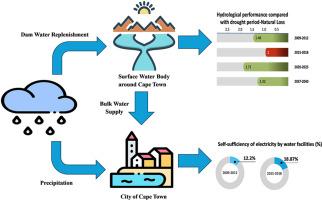Assessing the water metabolism of coastal urban areas based on the water mass balance framework across time periods: A case study of Cape Town, South Africa
IF 4.8
2区 环境科学与生态学
Q1 OCEANOGRAPHY
引用次数: 0
Abstract
The status of water resources in many coastal cities has become increasingly fragile. In a changing climate, the amount and intensity of rainfall have continued to decline, causing some coastal regions to experience severe drought and deteriorated water supply situation. This article presents a comprehensive study of the urban water metabolism of Cape Town, South Africa. A water mass balance framework was utilized to examine the city's water system across four distinct periods. In addition, the water-energy nexus before and after the drought crisis was evaluated. The key findings include a large amount of surface runoff in the Cape Town area that was not utilized before the drought crisis, resulting in a natural loss potential of water supply that is 2.54 times greater than water used for supply systems. During the drought, per capita water consumption dropped by a substantial 25%; at the same time, the total rate of water loss experienced a substantial decrease of approximately 21%. Since the pandemic, Cape Town's water resources policy has shifted to diversifying water sources, and the use of wastewater and natural water losses will be optimized by more than 32% in 2040 to achieve a water-sensitive city. Future research should explore the temporal and spatial dynamics of urban water flows, the impact of socioeconomic factors, and the integration of water system optimization models for enhanced urban water management.

根据水量平衡框架评估沿海城市地区不同时期的水新陈代谢:南非开普敦案例研究
许多沿海城市的水资源状况日益脆弱。在气候不断变化的情况下,降雨量和降雨强度持续下降,导致一些沿海地区遭遇严重干旱,供水状况恶化。本文对南非开普敦的城市水新陈代谢进行了全面研究。文章利用水质量平衡框架对该市四个不同时期的水系统进行了研究。此外,还对干旱危机前后的水能关系进行了评估。主要研究结果包括:干旱危机前,开普敦地区有大量地表径流未被利用,导致供水的自然损失潜力是供水系统用水量的 2.54 倍。干旱期间,人均用水量大幅下降了 25%;与此同时,水的总损失率也大幅下降了约 21%。自旱灾以来,开普敦的水资源政策已转向水源多样化,到 2040 年,废水和自然水损失的利用率将优化 32% 以上,以实现一个对水敏感的城市。未来的研究应探索城市水流的时空动态、社会经济因素的影响以及水系统优化模型的整合,以加强城市水资源管理。
本文章由计算机程序翻译,如有差异,请以英文原文为准。
求助全文
约1分钟内获得全文
求助全文
来源期刊

Ocean & Coastal Management
环境科学-海洋学
CiteScore
8.50
自引率
15.20%
发文量
321
审稿时长
60 days
期刊介绍:
Ocean & Coastal Management is the leading international journal dedicated to the study of all aspects of ocean and coastal management from the global to local levels.
We publish rigorously peer-reviewed manuscripts from all disciplines, and inter-/trans-disciplinary and co-designed research, but all submissions must make clear the relevance to management and/or governance issues relevant to the sustainable development and conservation of oceans and coasts.
Comparative studies (from sub-national to trans-national cases, and other management / policy arenas) are encouraged, as are studies that critically assess current management practices and governance approaches. Submissions involving robust analysis, development of theory, and improvement of management practice are especially welcome.
 求助内容:
求助内容: 应助结果提醒方式:
应助结果提醒方式:


